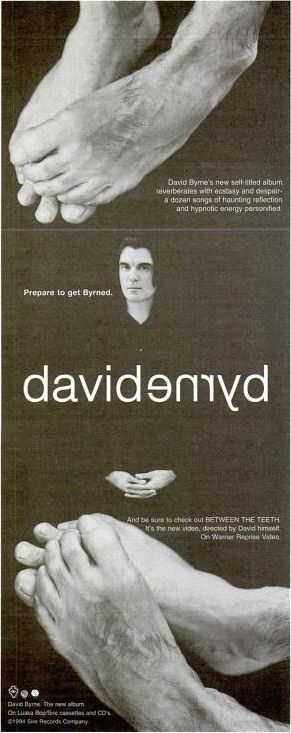 David Byrne's head is talking on his wry, dreamy new album
David Byrne's head is talking on his wry, dreamy new album
May 24, 1994|By J. D. Considine | J. D. Considine, Baltimore Sun Pop Music Critic
After a half-dozen years in which he's directed films, founded a record company and dabbled in worldbeat and orchestral music, David Byrne has finally gotten back to doing what he does best -- being himself.
"David Byrne" (Luaka Bop/Sire 45558 arriving in stores today) marks the singer's return to the wry, affectless writing style he perfected in his early work with Talking Heads. Like "Uh-Oh Love Comes to Town" or "Don't Worry About the Government," the best of these songs are tuneful, plain-spoken and full of wonder, depicting his world with dreamlike clarity and understated wit.
Simply put, it's his strongest work in more than a decade.
It's also -- and this may not be entirely coincidental -- his simplest work in a long time. Ever since Newsweek declared him "Rock's Renaissance Man" in the early '80s, Byrne (who grew up in Arbutus) has done his best to live up to that title, drawing on everything from dadaist poetry to Lucumi rites to show just how clever and eclectic he could be.
This album, by contrast, has nothing to prove on that level. Byrne's current band is a quartet (bassist Paul Socolow, drummer Todd Turkisher and mallet percussionist Mauro Refosco are the other members), and "David Byrne" offers an appropriately trim sound . Gone are the blaring brass and roiling percussion of his last couple of touring bands; gone, too, are the worldbeat experiments that fueled his previous solo efforts, "Rei Momo" and "Uh-Oh."
In their place are the sort of arrangements Byrne used to rely on when he was still part of Talking Heads. "Angels," for instance, opens with a rhythm vamp and recitation that recalls the opening verse of "Once In a Lifetime," while "Nothing At All," with its neatly harmonized chorus and coolly understated pulse, comes across as a close cousin to Talking Heads oldies like "Who Is It?"
That's not to say Byrne has begun repeating himself. For one thing, this new band has far greater range than the Heads did. It would be difficult, after all, to imagine the old Talking Heads maintaining the emotional balance of a song like "Crash," in which rage and tenderness intermingle in the roaring guitar and swirling percussion. Byrne's new band handles it easily.
Moreover, the level of imagination in Byrne's songs is well beyond where it was when "Talking Heads: 77" came out.
In addition to its deliciously dreamy blend of guitar, marimba and synths, "A Self-Made Man" boasts a hauntingly clever lyric about a future in which genetic engineering becomes the domain of mobsters. "And now we got a black market/A black market in designer genes," sings Byrne. "The most beautiful, most intelligent /Criminals you've ever seen."
Nor has Byrne entirely forgone his interest in global music. "You and Eye," for instance, includes a nifty mbaqanga guitar break, while the dark, minor-key melody of "Sad Song" floats over a cushion of Afro-Cuban percussion.
But this time around, those elements are mixed in more for spice than anything else. So although "My Love Is You" comes on as a samba of sorts, what we hear is less an exercise in musical exoticism than a clever means of making the song seem romantic, even as Byrne skewers the conventional notion of love song sentiments. (The tuba solo on the you're-a-jerk-I'm-a-jerk bridge is particularly brilliant.)
As a result , "David Byrne" allows the singer to have his cake, and eat it, too. By soft-pedaling his artistic ambition and downplaying his cultural reach, he's able to make music that's as enjoyable as it is ingenious.
It may be the smartest thing he's ever done.